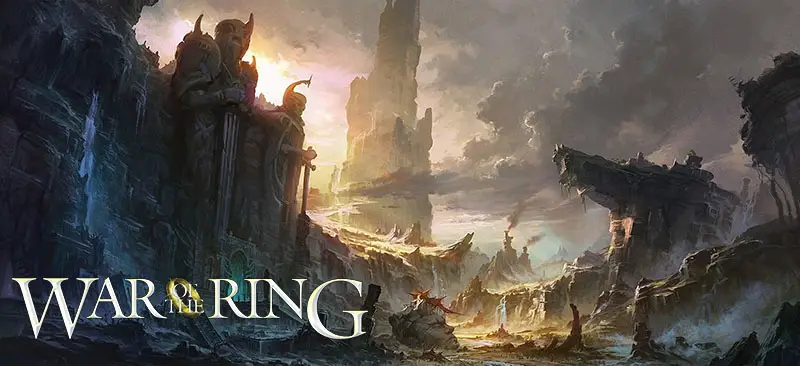
The end of the Third Age was a dark time for Middle-earth. While the basic allegiances of the Free Peoples were clearly defined, their individual opinions towards the threat of Sauron differed widely.
The diplomatic stance of the various Nations is represented in War of the Ring by a Nation's position on the Political Track found on the game board.
The Political Track
The initial starting position of a Nation on the Political Track (marked by the individual Nation's icon on the track itself) represents its diplomatic attitude at the beginning of the war. The farther its Political counter is from the "At War" step of the track, the less inclined that Nation is to take part in the conflict.
For a Nation to be considered completely mobilized and ready to fight, its Political counter must be in the last step in the track, marked "At War".
To further reflect their reluctance in entering the war, all the Free Peoples Nations except the Elves start the game in a passive state (represented by the gray side of a Nation's Political counter facing up).
As long as a Nation remains passive, it can never be moved to the last step of the track ("At War") and thus be fully mobilized.
Activating Free Peoples Nations
The Political counter of a Free Peoples Nation is turned to the active side (with the light blue side face up) when any of the following events occur:
A region of that Nation is entered by an enemy Army.
An Army containing units of that Nation is attacked.
The Fellowship of the Ring is declared in a City or Stronghold of that Nation.
When a Companion (capable of activating that Nation) ends his movement or enters play in one of its Cities or Strongholds, unless it is controlled by the enemy.
Each Companion card has a symbol, in its lower right- hand corner, that indicates which Free Peoples Nation the Companion is capable of activating upon ending his movement (or entering play) in one of that Nation's Cities or Strongholds.
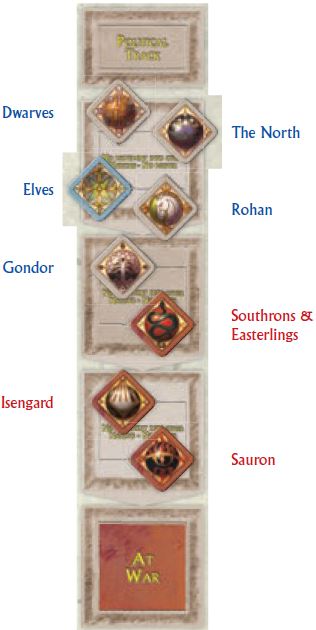
Note that Gandalf, Aragorn, Meriadoc Brandybuck, and Peregrin Took all show the "Free Peoples" symbol rather than one specific Nation's symbol.
These Characters are capable of activating any Free Peoples Nation upon ending their movement in one of its Cities or Strongholds.
Advancing a Political Position
The Political counter of a Nation is advanced (by moving it down a step toward the "At War" step) on the Political Track by using a Muster Action die result or by playing certain Event cards.
Additionally, the counter of a Nation is automatically advanced one step if any of the following events occur:
-
Every time an Army containing units of that Nation is attacked (each battle counts as one attack regardless of the number of rounds fought). Also, remember that when a Nation's Army is attacked, that Nation becomes active.
-
Every time a Nation's Settlement (Town, City, or Stronghold) is captured by the opponent.
Example: The Shadow player is attacking an Army of the North in the City of Dale. After the first round of combat, the Free Peoples player decides to retreat the only surviving North Regular unit.
The Shadow Army advances into the now captured City and places a Control marker on it. As a result, the North nation is activated and its Political counter is moved two steps on the Political Track since a North Army was attacked and a North City captured by the Shadow.
Event cards affecting the Political Track
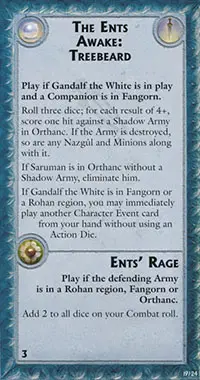
All cards that initiate an attack by an Army can trigger a political reaction (activation and/or advancement on the Political Track). The three "Ents Awake" Event cards and the "Dead Men of Dunharrow" Event card can also trigger a political reaction.
The effects of these cards are considered to be battles in which the enemy Army cannot fight back. All other cards that trigger a political reaction have the political effect explicitly stated in the text.
Entering War
A Nation that is not "At War" is considered to be non-belligerent. A non-belligerent Nation suffers various limits to the capabilities of its troops. In detail, Army units and Leaders of a non-belligerent Nation must adhere to the following restrictions:
They can move outside their National borders but can never move across the borders of other Nations (including friendly ones).
They cannot attack enemy Armies (but can defend if attacked).
They can never be recruited by using Muster Action die results.
All the restrictions listed above apply even if figures of a non- belligerent Nation are stacked with figures of a Nation "At War".
Exception: Non-belligerent figures are allowed to cross another Nation's border when retreating from a battle. If they do so, the next time they move, they must move out of that Nation, unless they became "At War" in the meantime.
Example: Two North units in Dale retreat from a battle. Even if the North is not "At War", the units may retreat to Erebor (which belongs to the Dwarf Nation). They could not do this as a normal move, but this move is possible as a retreat from combat.
When a Nation's Political counter moves into the last step of the Political Track, that Nation is now "At War".
A Nation "At War" is free from the constraints binding a non-belligerent Nation. Its Armies may freely move across all National borders and attack enemy Armies, and its troops can be recruited using Muster Action die results.
As noted before, a passive Free Peoples Nation can never enter the "At War" step, but must be activated first.
Characters at War
Companions, Minions, and Nazgul can freely move and be involved in battles regardless of the political position of the Nation they belong to. In essence, they should be considered already "At War".
Example: The Nazgul can participate in an attack even if Sauron is not yet "At War".
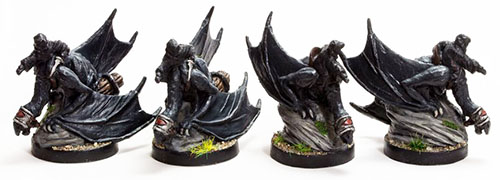
The Political Counters
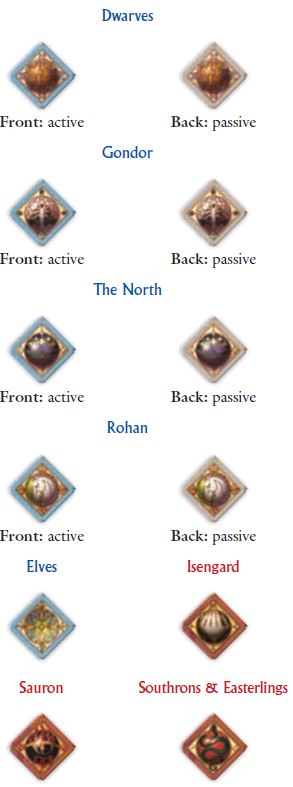
Continue Reading


